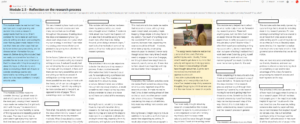Class information
LIBR 100 – Information Research
28 students
The focus of this class is on the research process, not the product. Students are asked to think and talk and write about their own processes: the ways they think about, search for, and use information for various purposes.
I co-developed and co-teach this online, asynchronous version of the class with another colleague in the Libraries.
In this modular, asynchronous class students are assigned one module each week. Each module consists of a variety of activities focused on a course-related topic. One component of each weekly module is a prompt that asks students to reflect on their own learning for the week and how the class work might affect their existing habits and processes moving forward. Sometimes we ask how that week’s work might apply to situations outside the realm of academic work.
We created this class in summer 2020 in response to the pandemic and the desire for Hunter to offer more summer courses – our department had not previously offered LIBR 100 in the summer – and we wanted to offer it in a more flexible format for students.
Project overview
In prior iterations of the class, we used the integrated Blackboard tools, like the discussion board or the blog, for student reflections. While these tools were fine, what we sought in this class where the students would never meet in person was a way for them to get to know each other a bit more, by being able to read about the experiences and reflections of the other students in the class. We also wanted an easier way for students to see and interact with their classmates’ posts outside of the Blackboard suite. Following my participation in this workshop, we shifted these weekly reflections to the online tool Padlet. We wanted a way for students to both reflect on their own learning, and see what other students were saying about the same course work and their own experiences. Padlet gave us the flexibility and visibility we wanted for these weekly reflections, and students began commenting on each other’s posts from time to time. This will also help us as we prepare to move our course out of Blackboard and onto the Commons as an Open Educational Resource.

Why did you select this project? How does it relate to identity and purpose?
Part of what we want students to learn in this course is that there is no “one right way” to conduct research. By opening up the weekly reflections using Padlet to make them more visible and visually interesting, students can scan their classmates’ posts and consider the different experiences of others while composing their own reflections. They are also free to include images and links if they desire, thereby personalizing their responses. We emphasize with our students that they already have established habits and practices when it comes to doing research, which they should build upon and think more deeply about.
Given the openness of the Padlet posts, students are able to also consider the habits and practices of others that might prove helpful to them in the future. Students will occasionally comment on something that they learned from another student.
What advice do you have for other faculty who would like to implement a similar project?
This was a simple change to the class that made a big difference, so if you have a tool that you think will be helpful, do it! I’ve used Padlet for lots of different instructional purposes both before and during the pandemic.
Refining the prompts has been an important part of our process as instructors, so be sure to have clear instructions or a good prompt before launching the Padlet.




